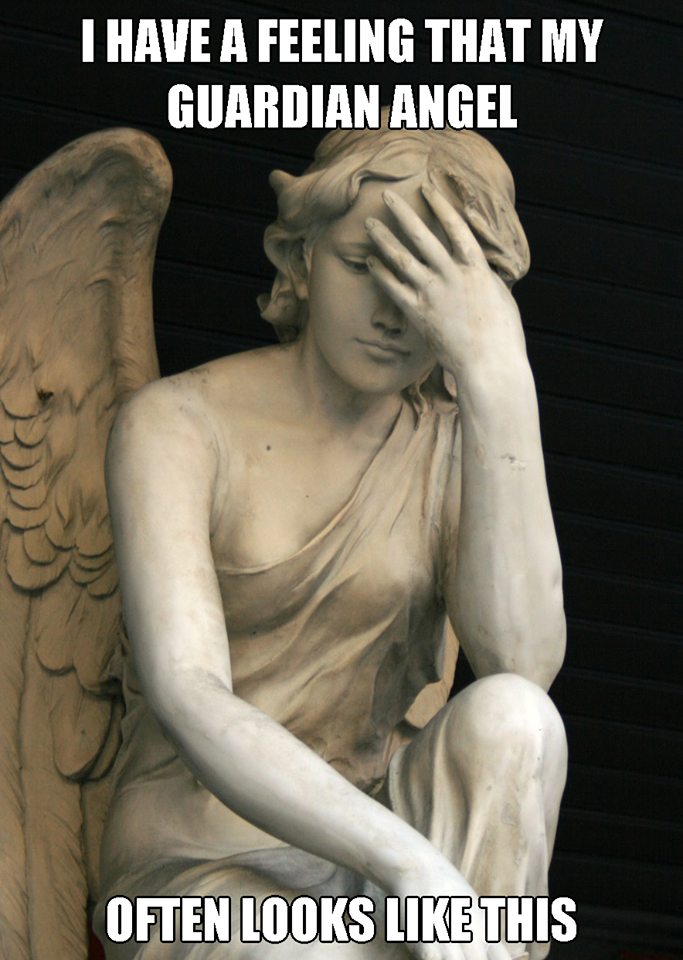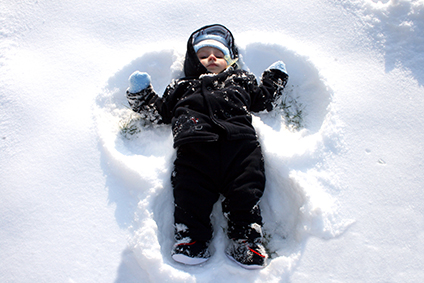Angels on High
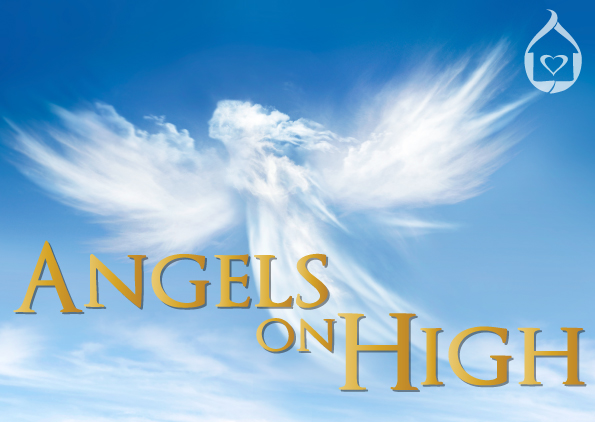
Over the last two decades, Angels have become very popular in New Age spirituality. With TV shows like Supernatural, and films like Constantine and Legion, as well as numerous books, the secular world seems very much enamoured with angels and their not-so-nice counter parts, demons.
The word ‘Angel’ is from the Greek, “aggelos,” and means “messenger”
What is a Catholic to make of all this?
What exactly are angels? Do they really exist and how do they work in the world? We thought we’d put to bed some common myths about angels, archangels, guardian angels and share some interesting stories from people who have had real, tangible experiences with their Guardian Angel.
“As purely spiritual creatures angels have intelligence and will: they are personal and immortal creatures, surpassing in perfection all visible creatures, as the splendor of their glory bears witness” (CCC, 330; Dan 10:9-12)
What are Angels and where do they come from?
Tradition tells us that God’s creative outpouring in creation not only fashioned the physical world with its physical beings, but also created beings that were pure spirit. Called ‘angels’ these beings do not have a physical body or gender and exist outside of space and time. They are a bridge between the physical world and the spiritual world.
Myth #1 We become angels in heaven
Whilst this is an oft-repeated myth, our loved ones who pass on do not become angels when they die and go to heaven. They are human souls living in the light and joy of the presence of God in heaven with the angels. These souls in heaven are able to intercede for us and in that way act powerfully here on earth, but they are not angels.
Myth #2 Angels are cute, chubby, cherubs with wings
Unfortunately, many powerful aspects of Christianity have become ‘domesticated’ in the 19th and 20th Century, angels among them. They are often portrayed as chubby, winged toddlers or dainty, slim adolescent girls.
If you look to the Old Testament stories, any time someone encountered an angel, they were overwhelmed in terror and awe. Angels are less like cherubs and more like large, brawny, spiritual, secret service agents, or if you want, the winged warriors often depicted in Byzantine Icons. Their role is to protect us from spiritual dangers (and in some instances, physical dangers too).
Angels don’t necessarily need wings either. They are spiritual beings and so their nature is what is called in theology ‘sublime’ meaning they can occupy any part of space and time, and therefore ‘fly’ between locations.
Archangels
Feast Day September 29
Orthodox tradition speaks of seven archangels while in Catholic tradition; only three are commonly spoken of.
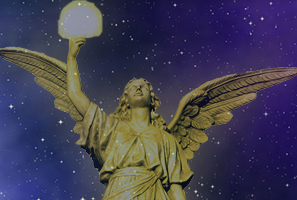 1. Gabriel is God’s herald, announcing good news, such as during his appearance before Mary as a young girl. “Hail Mary, full of grace! The Lord is with you!” (Luke 1:28). He also appears to Daniel (Chapters 8 and 9). St. Gregory the Great wrote: “He came to announce the One who appeared as a humble man to quell the cosmic powers. Thus God’s strength announced the coming of the Lord of the heavenly powers, mighty in battle” (excerpt from Hom. 34, 8-9).
1. Gabriel is God’s herald, announcing good news, such as during his appearance before Mary as a young girl. “Hail Mary, full of grace! The Lord is with you!” (Luke 1:28). He also appears to Daniel (Chapters 8 and 9). St. Gregory the Great wrote: “He came to announce the One who appeared as a humble man to quell the cosmic powers. Thus God’s strength announced the coming of the Lord of the heavenly powers, mighty in battle” (excerpt from Hom. 34, 8-9).
 2. Michael is known to be a warrior angel who commands God’s army. He is mentioned in the book of Jude (1:9) and in Revelations (12:8) where he is described as fighting a dragon (a symbol of evil). During a visit to the Sanctuary of Saint Michael the Archangel, John Paul II said, “The battle against the devil . . . is the principal task of Saint Michael the archangel.”
2. Michael is known to be a warrior angel who commands God’s army. He is mentioned in the book of Jude (1:9) and in Revelations (12:8) where he is described as fighting a dragon (a symbol of evil). During a visit to the Sanctuary of Saint Michael the Archangel, John Paul II said, “The battle against the devil . . . is the principal task of Saint Michael the archangel.”
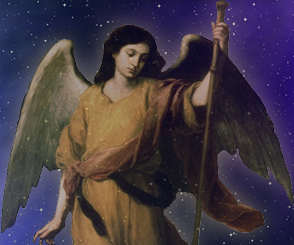 3. Raphael means “God is my health”. Raphael features strongly in the book of Tobit where he touches and heals Tobit of blindness and declares his identity: “I am Raphael, one of the seven angels who stand ready and enter before the glory of the Lord.”(Tobit 12:15)
3. Raphael means “God is my health”. Raphael features strongly in the book of Tobit where he touches and heals Tobit of blindness and declares his identity: “I am Raphael, one of the seven angels who stand ready and enter before the glory of the Lord.”(Tobit 12:15)
St. Augustine says: “‘Angel’ is the name of their office, not of their nature. If you seek the name of their nature, it is ‘spirit’; if you seek the name of their office, it is ‘angel’: from what they are, ‘spirit,’ from what they do, ‘angel.’” With their whole beings the angels are servants and messengers of God. Because they “always behold the face of my Father who is in heaven” they are the “mighty ones who do his word, hearkening to the voice of his word” (CCC 329; Mt 18:10)
Guardian Angels
Feast Day October 2
Billions of angels are given the personal charge of looking after their own human child of God. Every moment of our day, our guardian angels stand with us, protecting us and willing our well-being.
“From infancy to death human life is surrounded by their watchful care and intercession.”
“Beside each believer stands an angel as protector and shepherd leading him to life.” Already here on earth the Christian life shares by faith in the blessed company of angels and men united in God.” (CCC, no. 336).
A Story…
It could have been a terrible, even fatal accident. As the horse bolted and veered to the left to avoid the fence, I involuntarily slid to the right and into the nail studded post. My helmet-clad head cracked on the post as I fell, landing heavily on my knees. I was stunned and bruised where my sunglasses had pushed into my nose as it deflected a nail, but otherwise unhurt.
There is no doubt in my mind that my guardian angel saved my life that day, or at least, saved me from severe injury. I made sure to thank him… though I did suggest that next time he intervene five minutes earlier when the fateful decision to get on a horse is being made!
Fallen Angels
One of the first ‘angels’ to appear in scriptures is the ‘fallen angel’, Satan, where he tempts Adam and Eve to disobey God (Gen 3). Also known as Lucifer (which means ‘light’) tradition holds that he was one of God’s good angels, created naturally good by God as were all demons, but who have chosen to become evil through their free and irrevocable rejection of God and his reign. (CCC 391-393).
Evangelical Angels
Talking to non-believers about Jesus can be daunting. Yet many who reject Christianity are receptive to the notion of angels. Instead of beginning a conversation directly about Jesus, try asking your non-believing friend the question ‘Do you believe angels?’ Approaching the supernatural from this angle might be just the thing your listener needs to help him or her make the leap of faith a little bit less intimidating.
So there you have it… a crash course in Catholic Angelology (yes it is an area of expertise!) Whilst Angels are not a central element to Christianity, they are a logical part of our Tradition and are powerful intercessors and protectors.
Authors: Kiara & Francine Pirola
What do you think? Do you have any other questions or myths about angels that need clarifying? Do you have any stories about your guardian angel? We’d love to hear them so feel free to share in the comments below!
This article featured in the October 2013 edition of the CathFamily eMagazine. For more, check out:
